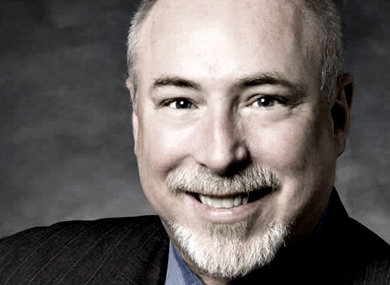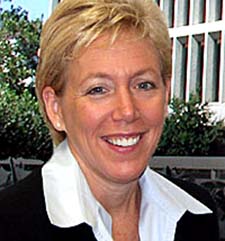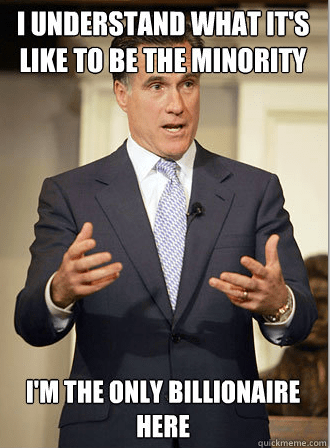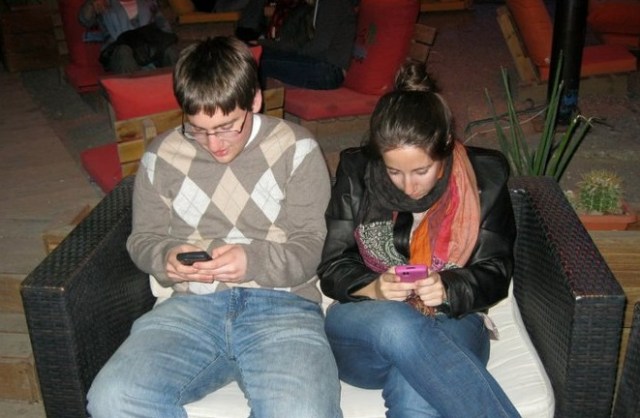Have you heard of Frank Schubert? The Advocate wrote a scathing profile about him on Friday, referring to him as “the man who orchestrated the Prop. 8 win…the person who is most shaping the outcomes on behalf of the antigay side.” Schubert is the PR strategist behind the Prop 8 ads that employed scare tactics, threatening that a “no” vote would lead to kids learning about gay marriage in schools (heaven forbid!), and he is the man behind the wins for gay marriage opponents in Maine and North Carolina. He is the new political director for the charming National Organization for Marriage, and a few months ago he left Schubert Flint Public Affairs, the firm he created in 2003, to focus on conservative issues. But what struck me most about the Advocate’s op-ed was a small statement, a qualifying phrase tacked on after a hateful quote from Schubert, but an interesting factual nugget nonetheless. Schubert “happens to have a lesbian sister who is in a long-term relationship with two children.” Well then.

We’re no strangers to politicians in high places who have siblings in the GLBT community, yet continue to hold homophobic perspectives near and dear to their hate-filled little hearts. In September 2010, Rachel and Riese wrote about Christine O’Donnell, the Tea Party Delaware Senatorial Candidate who has a lesbian sister, reminding us that “gay family members do not a homo-friendly politician make.” We chronicled a bunch of well-known gay family members and the (not so supportive) families that birthed them, asking, “What do Americans learn about how to treat their GLBT relatives from watching politicians fully willing to not only vote, but push forward legislation and ideologies which exclude the family members they allegedly care for? Are these really the “Family Values” our country ought to endorse?”

In a word, no. It’s really fucked up when politicians say they love their GLBT relatives and then turn around and make and support laws that prove they’re all talk, and it’s also really sad and possibly damaging when the GLBT community apologizes for and excuses this behavior. But when I googled Frank Schubert’s sister, Anne Marie Schubert, I found a Queerty post that takes Anne Marie to task for not standing up loudly against her brother, and I found myself feeling sorry for her and the harsh words the author penned against her. Granted, Queerty and I clearly don’t see eye-to-eye on many things (no matter how much I dislike someone, I’m not really comfortable referring to that person as a ‘marriage rights rapist’) but I managed to get past the troubling first sentence and read not only the article but also the comments. In the comments, “John from England” (who seems to be the author of the original post) writes, “I’ll put a disclaimer that I’m prolly [sic] being pretty harsh and unfair…But during the whole prop 8 thing…why didn’t she make herself more visible?…This could’ve really helped, the fact that this bright, woman with a brother that is ‘normal’ (in these homo haters eyes), is ‘just like you’?”
So we move past the question of what the general public learns from politicians who ignore their GLBT relatives’ well-being when pushing legislation that harms the GLBT community, and we arrive at a new question: What is reasonable to expect from members of the GLBT community when it comes to speaking out against their siblings who are running around the country pushing and passing incredibly damaging laws? Do we need — or should we require — every queer-identified person to become an activist in the face of oppression? Should we allow high-profile homophobes the luxury of their relatives’ “no comment”s? What is our other option? The Queerty article rubbed me the wrong way because we have no idea why Anne Marie didn’t make herself more visible. She’s a Republican, and she was running for the position of judge in Sacramento County Superior Court. She has a family who she may not want to drag into the spotlight. Maybe she hates all other gay people except her domestic partner and herself, I don’t know! (I’m being facetious. I don’t really think Anne Marie hates all gay people. Duh.) But she probably has several reasons for not making herself more visible against her homophobic brother, and we don’t know any of them because… she hasn’t shared them. Do I wish she would be more visible, more vocal, more publicly outraged? Well, sure. But do I think it’s fair to pit her against the GLBT community and act like her silence is a tacit indication that she supports her brother and his actions? Not really. We’re all doing the best we can every day. I can only assume she’s doing her best, too.
While reading about Frank Schubert and thinking about siblings and Republicans and expectations, I found myself taking it all kind of personally. Why? I don’t have a Republican politician who hates gay people in my family. Rather, I have an amazing, intelligent little brother who is one of my best friends in the whole world. He loves Ani DiFranco and Andrea Gibson. He’s the first person to whom I came out and was the first person in my family to meet my current girlfriend (and they are super close and when we hang out I end up feeling like the third wheel while they talk about comic books and beer, so.) He is unbelievably supportive, he chastises my mother when he thinks she’s not showing me enough acceptance, and he is socially liberal. He will also be voting Republican in the November 2012 presidential elections.

It’s not the same at all, having a brother who heads up NOM and has gone on record saying he doesn’t accept your gay marriage and prays for your children, and having a brother who is loving and supportive and just happens to prefer any human who isn’t Barack Obama when choosing a president of the United States. It’s important that I’m clear that I’m not equating my own little brother with Frank Schubert, and I am not implying that my brother’s decision at the polls is anywhere near as dangerous as Schubert’s actions and mission. But learning about Schubert and his sister brought a lot of personal feelings I’ve been having to the forefront of my brain, and it’s bringing me to another question that I find just as compelling as the one Rachel and Riese asked in 2010. My question is this: How do we reconcile the fact that our relatives who love and support us may have strong political opinions that encourage them to vote for politicians who are hell-bent on discriminating against and harming the GLBT community? What can we reasonably expect from our relatives when it comes to voting?
Though my brother and I have disagreed on many political issues from the time he started reading and agreeing with The Wall Street Journal (approximately 2009, his senior year of high school) I think I’m feeling particularly contemplative because this is the year that things get real for us. My family has had Canadian citizenship up until literally last month, so even though we’ve lived in a suburb outside of Boston since 1999, we have never voted in a presidential election (also my brother wasn’t legal voting age until 2009, so I guess citizenship would’ve proved irrelevant up until now.) This is the first time in our entire lives that we will be eligible to vote. So suddenly all of our dinner table conversations about politics, the time I left my brother’s birthday dinner crying over a conversation about late-term abortion, the time my brother emailed me an article from the WSJ asking for my opinion and I copied it into a Word document and sent it back to him, annotated, with a note asking him not to take my harsh tone personally because it was just tough to disagree with such an asshole in a neutral tone… all of those instances are going to boil down to a concrete thing provided to us by this democratic nation: a vote. All the hypotheticals, all our feelings, all our disagreements will mean something this November. I will vote for Barack Obama, and my brother will vote for Mitt Romney. And I guess what I’ve been trying to figure out is, if a newspaper called me up and asked what my brother’s vote meant to our relationship… what would I say?

As I said, my awesome baby brother is absolutely nothing like Frank Schubert. His reasons for voting Republican have nothing to do with hating gay people, and his social politics are liberal. But he truly feels that voting Democratic is not an option this year, because of Obama’s economic policy and foreign policy, and while he doesn’t like the idea of identifying as a Republican, he acknowledged that in the United States of America we have two major political parties, and most people align themselves with one or the other, often choosing the “lesser of two evils.” His choice is the Republican party, though he finds their social politics “repugnant.”
So I’m left with the question of what I should think about all this, and if I need to have an opinion one way or the other. I have always said that I could never be in a serious relationship with someone who does not have the same political ideologies as me, and that’s true. If you vote Republican I don’t want to hold your hand, I don’t want to snuggle you, and I don’t want to go to bed with you at the end of the day. I get a lot of flack from friends and family members for my constant refrain that “not all opinions are created equal,” but let’s be real, how can they be? If your opinion is that gay people do not deserve basic human rights, I think your opinion is wrong. But the truth is, I am in a serious relationship with someone who does not have the same political ideologies as me: that person is my brother, and our relationship is super serious. I adore him, I consider him my best friend, and I enjoy our disagreements because he’s smart and can back up his opinions, even when I think they’re wrong. I honestly can’t think of anything he could do to change or harm our loving relationship. Even if he votes for Romney in November.

What do you think, fellow queermos and humans who may be involved in serious familial relationships with people who do not hate you — who love and respect and admire you — but who will be voting for people who do, in fact, hate you and want to harm you? My brother may not be the one in Washington pushing policies, but when his vote contributes to a decision that will ultimately affect my life — even if he is technically on my side when it comes to his social politics — do I hold him accountable? And for what?
I’m honestly not sure. For now I believe that I will continue to love my brother, no matter what November 2012 brings. I think this conviction — this love in the face of extremely different political choices — comes down to three major things: history, intent, and hope.
It’s easy to meet a fellow grown-up and dismiss the possibility of fostering a relationship (platonic or romantic) because we disagree on fundamental issues. It’s a little bit harder to dismiss the person who hosted Easy Bake Oven tea parties with me when we were little, who I sat with at every brother-sister lunch at sleepover camp from 2000-2009, who said easily, “I see why you like her,” when the rest of my family said, “I thought you liked boys.” My brother and I have a past, and so far nothing that has happened in the present can erase what those memories means to me.
His unconditional love and acceptance also make his political ideals harder to hate. Were he actively anti-gay rights, I would be unable to make excuses and our relationship would likely suffer. But he’s not. His intentions when voting Republican are not to harm me. The fact that his vote may put a man in power who undoubtedly will is tough to swallow, but I’ve managed to separate his intent and the ramifications of his vote in my mind, and it allows me to keep loving him. Were he Frank Schubert, I doubt that would be possible. But he’s not.
And honestly? I really hope Obama wins. If I never have to confront the reality of Romney in office, it will be that much easier to forget that my brother wanted him there. And it will be that much easier to do what my heart really wants to keep doing for the rest of my life, regardless of what happens during election season: loving my little brother.
Special Note: Autostraddle’s “First Person” personal essays do not necessarily reflect the ideals of Autostraddle or its editors, nor do any First Person writers intend to speak on behalf of anyone other than themselves. First Person writers are simply speaking honestly from their own hearts.







